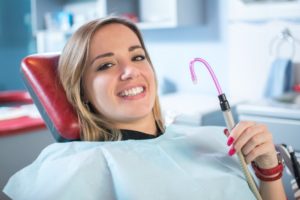
With the outbreak of COVID-19, many health-conscious patients are educating themselves about the measures that dental professionals take to maintain a clean, safe environment. One often-overlooked aspect of preventing the spread of illness in the dental office is chairside suction. We invite you to read this post to learn how chairside suction devices help to keep you and your oral surgeon in Houston as healthy as possible.
Bioaerosols in Dentistry
Bioaerosols are particles that get released into the air during dental procedures. They include things like tiny droplets of saliva and blood. These droplets can contain many of the over 700 species of bacteria that are naturally present in the mouth. Viruses may also be present in bioaerosols.
As you can imagine, if bioaerosols go uncontained and get breathed in, they can easily spread illness from one person to the next. In fact, according to one estimate, they can travel over 18 feet from their source and linger in the air for half an hour! Most dental treatments, including routine cleanings, basic restorative services, and oral surgery, can release a significant amount of bioaerosols.
Suction Contains Bioaerosols
Dental suction devices are little vacuums that suck up a large percentage of the bioaerosols that get released during treatments (the exact percentage depends on the specifications of the suction machine). These devices fall into two categories — intraoral and extraoral. An intraoral suction device actually gets placed inside the mouth. An extraoral suction tool gets set up close to the patient’s mouth.
Both intraoral and extraoral suction devices protect the dental team from potential contagions that get released from a patient’s mouth. They also prevent the bioaerosols from settling on surfaces throughout the office or traveling into nearby rooms and posing a threat to other patients.
Other Benefits of Suction Devices
Preventing the spread of illness is only one benefit of dental suction. Other reasons your oral surgeon uses it include:
- Prevention of saliva buildup. Some dental treatments require a dry environment in order to be successful. Suction prevents saliva from interfering with a procedure’s efficacy.
- Airway protection. If you are sedated during oral surgery, suction can help to keep your airway clear.
- Choking prevention. Foreign objects in your mouth, including dental instruments, can cause you to produce extra saliva, which may trickle downward and cause you to gag or choke. Suction prevents this problem and helps you to enjoy a comfortable treatment experience.
You can breathe easy during dental treatments! The next time you schedule an appointment with your dentist or oral surgeon, you can be confident that they will use suction and other safety measures to protect both their health and yours.
About the Author
Dr. Steve L. Koo earned his dental degree from The University of Texas at Houston in 1999, after which he completed his residency in oral and maxillofacial surgery. He and the entire Piney Point team are committed to maintaining a safe office environment, which is why we use suction devices and other advanced, health-supporting technology. To learn more about us, our services, and how we protect the overall health of our patients, contact us at 713-783-5560.

